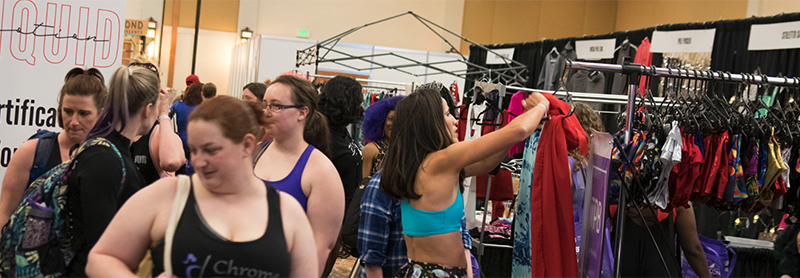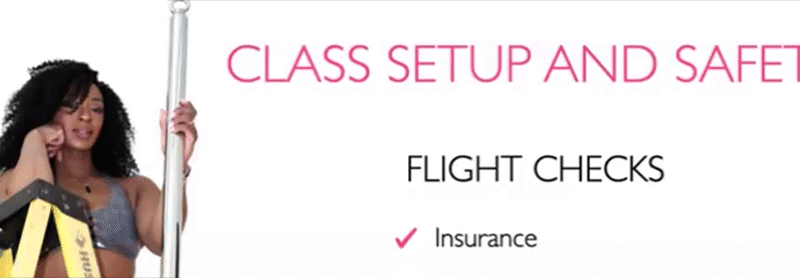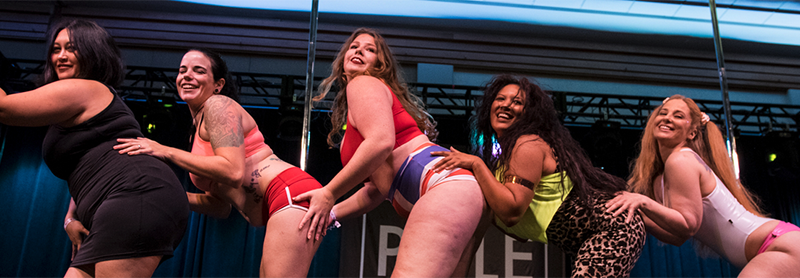A train-cation is a trip (usually away from home) where you focus for a specific…

Do you need music licensing for virtual pole dance classes?
All studios, events, and performances need to have a license to play music in-person. With the rise of virtual events, do the same rules apply?
The answer is a little more complicated than a simple “yes” or “no.”
Traditional music licensing
US Copyright Law requires you to have a license, or the artist’s written permission, to use a song for “public performance.” Your free and paid online class content falls into this category along with events, performances, or competitions.
There are three primary companies that manage most music licensing around the world: ASCAPASCAP, BMI, and SESAC.
These companies grant you a license to play copyrighted music in your pole or dance studio space or during your events. There are different levels of licensing with a range of associated fees depending on the number of people who hear the music you are playing. Typically, these licenses are granted to a studio for a year or for a single event and cover most popular music.
Even if you are paying for a music service like Spotify, Apple, or Amazon, that doesn’t give you the license to play the music in your business; Most of their terms and conditions specify that you use their music in a non-commercial way. You do need a separate license for any commercial or business uses. Many studio owners report receiving notices threatening huge fines for non-compliance from the music licensing companies if they haven’t already signed up for a license.
Most licenses are clear that you are paying for the right to play music in your space. However, with the rise of virtual classes, the people listening to music aren’t in your space—they are in their space. Sometimes your instructors aren’t even teaching out of your space. The same is true for some events. Does it matter if your event is live or prerecorded? Licensing can be very confusing for the individual instructor, performer, or pole-preneur!
What are my virtual music licensing options?
Currently, there is no completely clear answer as to how to correctly pay for music licensing for your virtual classes or during virtual events.
Some experts refer to a different kind of license called a Synchronization License, which allows you to play music during a TV show. That is not quite the same as a fitness class. Peloton, the popular virtual cycling brand, was sued in 2020 for not paying the correct licenses for music and lost, incurring a hefty fine, so this issue is getting more attention.
According to ASCAP: “most popular live-streaming platforms, such as YouTube, Facebook, Instagram Live, Soundcloud and Twitch are licensed by ASCAP. So, if you’re using one of those to broadcast a performance or event, you’re likely covered.”
ASCAP also now offers a digital license “for use by owners of websites and mobile apps which feature public performances.” But this still doesn’t cover studios or teaching classes over Zoom.
You could use royalty-free music, but know that this doesn’t mean the music is free. Nor does it mean that you can use the music in any way that you want. Make sure to read the information in the license clearly before you use it, or you could be liable for fines.
Some websites that specialize in providing on-demand video hosting services may offer to let you use music that they have already paid the licensing for in your videos. This would cover on-demand but not necessarily live content.
The last option to legally play music during your classes is to go a completely “music-free.” You don’t play music during your classes at all. Instead, you share a playlist, such as through Spotify, that your students download to play in their space. This does add an extra level of complexity and can be hard to synchronize for choreography-based classes.
What’s the bottom line?
This is still an evolving issue, and the law hasn’t quite caught up to how people are using the internet to teach, perform, and promote themselves in a combination of live and on-demand options using a variety of platforms and services. Hopefully more clarity is coming, but until then, make sure you are using the best option for your business needs!



